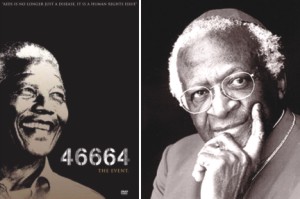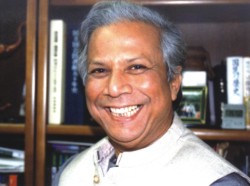|
Reflections
Between Hope and History
 |
Prof. Yunus now walks in such exalted company as Nelson Mandela and Archbishop Desmand Tutu. |
Nausher Rahman
It is sadly not often that, as a new member of the Bangladeshi diaspora, one is able to get a positive response about Bangladesh from one's new neighbours. Foreigners that have not had the opportunity to visit our land of birth invariably recite the same oft-repeated litany of stereotypes- desperately poor, plagued with floods and typhoons, corruption, instability, political violence. In my half-a-decade living in South Africa I have, more often than not, encountered ignorance about our country that extends much further. Variations of “Oh, so you're from India?” or “Where in India is that?” are comments I have heard with mind-numbing frequency. One wretchedly misinformed person even went so far as to say, “Ah, the capital of India”! Some of the more imaginative South African's will start off with a pithy comment about our cricket, comments that I feebly rebut not with any logic or evidence, but rather the passionate hope our eleven boys will one day prove them wrong. Older people sometimes recall George Harrison's seminal 1971 Concert for Bangladesh. All in all, not very rousing imagery that we seem to inspire.
 |
Nobel Laureate Prof. Yunus has given us reason to be proud of our nationality |
To change the opinions of an entire nation one person at a time is a bit of a thankless task, as I've discovered. Occasionally dispiriting, I feel a frustrated anger as deep down inside I cannot really fault these perceptions. As disappointing as it is to admit, the fact is that our country's leaders have given us far more things to disapprove of than not. Any good, and there is much in our people, is drowned out by the cacophony of bad. The Fourth Estate is predicated on exposing the uncomplimentary, and inevitably all else gets pushed aside and in the absence of first-hand experience, perceptions become based in the reality of disheartening news reports.
When I woke up on 13 October, and got ready to drive to work, I had no inkling that my world had changed. Settling into my office, my computer slowly woke up to connect me to the greater world. Within seconds of logging online, an Instant Messaging window popped-up- A good friend I haven't seen in years, at the other end of the world, sending a message. The excitement and urgency of his words brooked no time for niceties, no 'Hi' or 'Hello', no 'How are you?' It was a message that will be difficult to forget- “Prof. Yunus won the Nobel Peace Prize!!!!!!!” Within seconds, my younger brother, sent me the exact same message, bar a few more exclamation marks. Shock, excitement, elation and giddiness cascaded together as I sat mute, too stunned to write back. As I slowly got my breath back, my initial reaction was to run out of the office, and shout out to all my colleagues the monumental news. I decided, wisely in retrospect, to write back to my friend. My words failed the articulation of expression demanded by as significant a moment, and all I could manage was an inelegant “Are you serious!!!!!! ”, followed by an equally eloquent “Oh wow!!! Awesome!!!!”.
Slowly it began to sink in. So many of us had known for so long he deserved such a day, so many of us quietly resigned ourselves to muted disappointment as different winner after winner would be announced year after year.
None other than Bill Clinton himself famously expressed in his autobiography how much Prof. Yunus deserved the prize, a sentiment he also expressed at the University of California, Berkley, in 2002, describing Yunus as “…a man who long ago should have won the Nobel Prize. I'll keep saying that until they finally give it to him.” His time had come, and collectively we could now bask in the glorious spotlight of his achievement.
Needless to say, the order of the day for me was to spread the word as far and wide amongst my friends and colleagues here as possible. It started with a group email to the entire company breaking the news. The congratulatory responses started almost immediately. It felt so good! The quirk of fate was not lost on me- here was I being vicariously lauded on behalf of a country for winning it's first Nobel Peace Prize, from people living in a country that has uniquely produced four such special people.
From Chief Albert Luthuli (venerable president of the ANC and staunch non-violent opponent of apartheid) in 1960, to Archbishop Desmond Tutu in 1986, and of course the familiar names of Nelson Mandela and FW de Klerk in 1994, South Africa troubled and disturbed past has thrown up four of the greatest champions of humanity in the history of mankind. How nice it felt knowing Prof. Yunus walks in such exalted company!
Later that evening, sitting with friends for the customary Friday night drinks, unwinding from a busy week, someone asked about the smile I seemed to have indelibly plastered across my face. An explanation later, another friend raised a glass “to Prof. Yunus and Bangladesh”. My smile only widened. Needless to say some good natured ribbing followed- “So excited with only your first!?”, “150 million people and you only have one?!” and so on and so forth. A few friendly retorts, but nothing could dampen my enthusiasm.
That weekend, given a bit of time for reflection, the enormity of it all came to bear on me. I was reminded of the words of the Irish poet Seamus Heaney (also a fellow Nobel laureate), whose interpretation of Sophecles' Philoctetes, The Cure at Troy, contains the following words-
History says, Don't hope
on this side of the grave.
But then, once in a lifetime
the longed for tidal wave
of justice can rise up,
and hope and history rhyme.
So hope for a great sea-change
On the far side of revenge.
Believe that a further shore
Is reachable from here.
It felt indeed as if through his monumentally untiring endeavours, Prof. Yunus had been able to make hope and history rhyme, even if for a short while. Our history is well known, illustrious in parts, ignoble in others. Our future is less certain, our hope for better days tempered by the realities of today. In Prof. Yunus' actions, there seems to be that glimmer of hope, and that distant echo of hope and history coming together to speak with one voice. Time will tell the durability of all his achievements, but if not anything else, the example set is one we would do well to emulate. To struggle against the inhumanity and wretchedness of poverty, to allow light in the darkest of existences, he has bathed us all in the righteousness glow of a just cause.
Exactly a week later, I found myself spending the weekend in Soweto with colleagues and clients. As the restless, impatient heart of Johannesburg's anti-Apartheid movement, the township is awash with the history, and indeed the blood, sweat and tears of so many martyrs. The customary tour route took us to the Mandela family museum, set in the tiny house that was once home to Nelson and Winnie Mandela. Walking through the cramped rooms, seeing the photo's, gifts and souvenirs on the walls, it was easy to see how greatness need not great beginnings. The house lies nestled on Soweto's famed Vilakazi Street, famous because it is the only street in the world to house two Nobel Peace Prize laureates- Archbishop Tutu's house is down the road.
We booked into a bed and breakfast a few houses away from the museum, and as I went to sleep that night in Vilakazi Street, a stone's throw away from where two of history's most illustrious Nobel laureate's once slept, I could not help but feel that I lay between hope and history. In the visions of my sleep, Tutu, Mandela, Soweto, Vilakazi Street and Prof. Yunus came together, bound by a special thread of almost supernatural humanity. It seemed as if Heaney's 'further shore' was indeed reachable from here, suddenly not so far away at all. Prof. Yunus, you have made us proud. I can now honestly say, it feels good to be a Bangladeshi in South Africa, and it feels great to be between hope and history.
Copyright (R) thedailystar.net 2007 |
